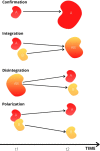Conceptualizing controversies in the EU circular bioeconomy transition
- PMID: 35320514
- PMCID: PMC9378795
- DOI: 10.1007/s13280-022-01730-2
Conceptualizing controversies in the EU circular bioeconomy transition
Abstract
The transition towards a circular bioeconomy (CBE) in the European Union is not without contestation. In particular, research has highlighted potential trade-offs of the large-scale production of bio-resources, for instance with environmental quality goals. To date, however, it remains underexplored in the CBE literature how controversies develop throughout a transition process. To address this gap, this paper explores where controversies are situated in a transition, how they change throughout, and how they influence the transition process. First, we suggest that controversies can be situated on and between different system layers within a transition. Second, we offer an explanation of how controversies evolve, as actors confirm, integrate, disintegrate and polarize underlying storylines. Third, these controversies can have both productive and unproductive outcomes while they unfold throughout a transition. We illustrate this understanding with the example of biorefineries as CBE key technology and discuss a research agenda on controversies in sustainability transitions.
Keywords: Biorefinery; Circular bioeconomy; Discourse coalition; European Union; Policy controversy; Sustainability transition.
© 2022. The Author(s).
Figures
References
-
- Arancibia F. Challenging the bioeconomy: The dynamics of collective action in Argentina. Technology in Society. 2013;35:79–92. doi: 10.1016/j.techsoc.2013.01.008. - DOI
-
- Avelino F. Theories of power and social change. Power contestations and their implications for research on social change and innovation. Journal of Political Power. 2021 doi: 10.1080/2158379X.2021.1875307. - DOI
-
- Avelino F, Wittmayer JM, Pel B, Weaver P, Dumitru A, Haxeltine A, Kemp R, Jørgensen MS, et al. Transformative social innovation and (dis)empowerment. Technological Forecasting and Social Change. 2019;145:195–206. doi: 10.1016/j.techfore.2017.05.002. - DOI
-
- Bauer F. Narratives of biorefinery innovation for the bioeconomy: Conflict, consensus or confusion? Environmental Innovation and Societal Transitions. 2018;28:96–107. doi: 10.1016/j.eist.2018.01.005. - DOI
-
- Bosman R, Loorbach D, Frantzeskaki N, Pistorius T. Discursive regime dynamics in the Dutch energy transition. Environmental Innovation and Societal Transitions. 2014;13:45–59. doi: 10.1016/j.eist.2014.07.003. - DOI
MeSH terms
Grants and funding
LinkOut - more resources
Full Text Sources
Miscellaneous



